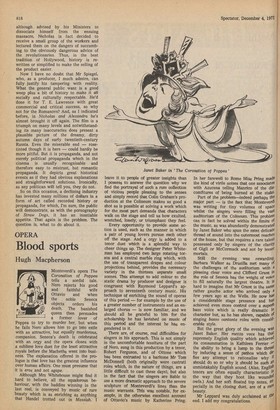OPERA
Blood sports
Hugh Macpherson
Monteverdi's opera The Coronation of Poppea tells a sordid tale. Nero rejects his good and faithful wife Ottavio and when the noble Seneca objects orders his death. The banished queen then persuades a former lover of Poppea to try to murder her, but when he fails Nero allows him to go into exile with an attractive, but equally murderous, companion. Seneca's death is celebrated with an orgy and the opera closes with a sublime love duet for the least attractive royals before the Macbeths went into business. The explanation offered in the prologue is that love has the greatest influence over human affairs. One must presutne that it is eros and not agape.
Although Mrs Whitehouse might find it hard to believe, all the squalorous behaviour, with the baddies winning in the last reel, is conveyed by music of rare beauty which is as enriching as anything that Handel trotted out in Messiah. I leave it to people of greater insights than I possess to answer the question why we find the portrayal of such a rum collection of vicious people pleasing to the senses and simply record that Colin Graham's production at the Coliseum makes as good a shot as is possible at solving a work which for the most part demands that characters walk on the stage and tell us how exulted, wretched, lonely, or triumphant they feel.
Every opportunity to provide some action is used, such as the manner in which a pair of young lovers pursue each other off the stage. And a orgy is added to a tenor duet which is a splendid way to cheer things up. The designer Peter Whiteman has employed two large rotating torsos and a central marble ring which, with the use of transparent drapes and colour projections behind, provides the necessary variety in the thirteen separate small scenes. This attempt to add colour to the static drama by producer and designer is congruent with Raymond Leppard's approach to seventeeth century music. His technique of enriching the sound of operas of this period — for example by the use of a greater number of instruments and an enlarged chorus — is now familiar, and we should all be grateful to hitn for the scholarship he has lavished on music of this period and the interest he has engendered in it.
There are, of course, real difficulties for singers in his approach. This is not simply in the uncomfortable tessitura of the part of Nero, sung in this production by a tenor, Robert Ferguson, and of Ottone which has been entrusted to a baritone Mr Tom McDonnell (both originally were castrati roles which, in the nature of things, are a little difficult to cast these days), but also in the fact that the singers are liable to use a more dramatic approach to the severe sculpture of Monteverdi's lines than the music warrants. This was notable, for example, in the otherwise excellent account of Ottavio's music by Katherine Pring. In her farewell to Rome Miss Pring made the kind of virile noises that one associate with Azucena telling Manrito of the 0' comfitures of being burned at the stake. Part of the problem—,indeed perhaps the. major part — is the fact that Monteverd1 was writing for tiny volumes of space whilst the singers were filling the vast auditorium of the Coliseum. This problen1 can in fact be solved within the limits of the music, as was abundantly demonstrated by Janet Baker who spun the mOst delicate thread of sound into the outermost reaches of the house, but that requires a rare talent possessed only by singers of the claritY of Gigli or McCormack and not by lesser mortals.
Still the evening was rewarding. Barbara Walker as Drusilla met many of the challenges of the auditorium with pleasing clear voice and Clifford Grant 10 the role of Seneca has the weight of voice to fill naturally the largest theatre. It is hard to imagine that Mr Grant is the saille rather gauche actor who arrived only few years ago at the Wells. He now has a considerable stage presence and he achieved even more control over a superb bass voice which is really dramatic 10, character but, as he has shown, capable 07 singing basso oantante roles with consid' erable style.
But the great glory of the evening We Janet Baker. Her mezza voce has that supremely English quality which achieved its consummation in Kathleen Ferrier the ability to bring a lump to the thr01° by inducing a sense of pathos which de: fies any attempt to rationalise why should do so or why it shOuld be such all unmistakably English sound. (Alas, EngliSh tenors are often equally characteristic 10, the way that they hoot like wound owls.) And her soft floated top notes, eS' pecially in the closing duet, are of a rare beauty. Mr Leppard was duly acclaimed at the end. I add my congratulations.










































 Previous page
Previous page